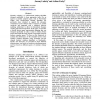Free Online Productivity Tools
i2Speak
i2Symbol
i2OCR
iTex2Img
iWeb2Print
iWeb2Shot
i2Type
iPdf2Split
iPdf2Merge
i2Bopomofo
i2Arabic
i2Style
i2Image
i2PDF
iLatex2Rtf
Sci2ools
167
click to vote
AIIDE
2009
2009
Examining Extended Dynamic Scripting in a Tactical Game Framework
Dynamic scripting is a reinforcement learning algorithm designed specifically to learn appropriate tactics for an agent in a modern computer game, such as Neverwinter Nights. This reinforcement learning algorithm has previously been extended to support the automatic tion of new abstract states to improve its context sensitivity and integrated with a graphical behavior modeling architecture to allow for hierarchical dynamic scripting and task decomposition. In this paper, we describe al abstract game representation language that was specifically to make it easier to define abstract games that include the large amount of uncertainty found in modern computer games. We then use this framework to examine the effectiveness of the extended version of the dynamic scripting algorithm, using Q-learning and the original dynamic scripting algorithms as benchmarks. Results and discussion are provided for three different games: one based on combat in role-playing games and two based on different as...
AIIDE 2009 | Artificial Intelligence | Dynamic Scripting | Dynamic Scripting Algorithms | Reinforcement Learning Algorithm |
| Added | 08 Nov 2010 |
| Updated | 08 Nov 2010 |
| Type | Conference |
| Year | 2009 |
| Where | AIIDE |
| Authors | Jeremy Ludwig, Arthur Farley |
Comments (0)

